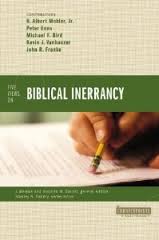 I’ve begun seeing some ads online and in catalogs on an upcoming book I contributed to, Five Views on Biblical Inerrancy
I’ve begun seeing some ads online and in catalogs on an upcoming book I contributed to, Five Views on Biblical Inerrancy, part of Zondervan’s Counterpoints genre (see my earlier announcement here).
I’ve also seen some posts by eager beavers anticipating the end of the space-time universe within a day or two of it’s release date (November 2013).
The five contributors (Al Mohler, Kevin Vanhoozer, Michael Bird, John Franke, and moi) have at this point only seen each other’s essay and written our responses, but there is nothing that I have seen that would indicate the sort of mudslinging or knock-down-drag-out bar brawl some are assuming (i.e., hoping for).
Now, make no mistake, we all have our own opinions on the matter, and you’re going to see some sharp differences at some key points that I think many readers will find interesting, confirming, and controversial, but don’t think of it as a final episode of “Survivor” with one resilient voice left standing (unless you imagine that voice to be mine).
A strength of this volume is that all five of us had to include in our essays an explanation of how inerrancy works (or doesn’t) by engaging the same three issues:
- The historicity of the fall of Jericho;
- The conflicting accounts of Paul’s conversion in Acts;
- Canaanite genocide vis-a-vis Jesus’ teaching.
Alert readers among you will notice that 1 and 3 deal with the same historical issue: the historicity of the conquest of Canaan (though #3 addresses the moral/theological implications).
Alert readers will also note that there is one Old Testament scholar in the group of five, but I digress.
Unlike, say, the the Exodus, for which there is no direct affirmative evidence, only a curious, deafening archaeological silence, for the conquest there is significant–most would say incontrovertible –evidence to the contrary.
Douglas Knight and Amy-Jill Levine summarize the 100+ years of archaeological investigation: Archaeologists have long tested the evidence for the sweeping military campaign portrayed in the book of Joshua, and their results are not encouraging for a Late Bronze Age setting. (The Meaning of the Bible: What the Jewish Scriptures and Christian Old Testament Can Teach Us, p. 20)
The conquest is a good test case for considering the viability of an inerrantist model of Scripture, and I think readers will be interested in how the various authors handle it.
In any event, like I said, don’t expect a pistols-at-dawn moment. Some may find moments to first-pump about, but the volume’s editors (James Merrick and Stephen M. Garrett) intended to lay out where things stand and what needs to happen at this stage of the game.
